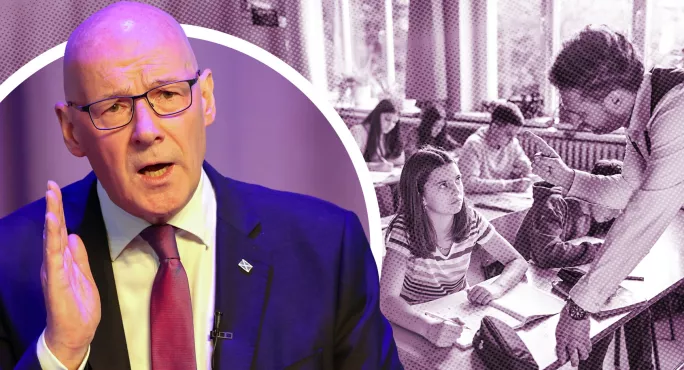Guidance on consequences for behaviour in schools is “crystal clear” on exclusions, first minister John Swinney has insisted.
He was responding after Scottish Conservative leader Russell Findlay used his slot at First Minister’s Questions this afternoon to condemn the guidance - published on Tuesday - as “49 pages of tedious, handwringing nonsense” that is “complicated and confusing”.
In particular, despite a change of tone on exclusions for more than a year in the run-up to the guidance - education secretary Jenny Gilruth had stressed on a number of occasions that exclusions should remain an option for schools - the Tory leader argued that the government’s stance remained unclear to schools.
‘Use exclusions to protect school staff’
“My party has long argued that a stricter approach is necessary to restore discipline in schools - we believe in exclusions for violence, because they protect staff and people and because they work,” said Mr Findlay. In contrast, the new guidance “says exclusions should only be considered as a last resort”.
He added: “So where does the SNP actually stand on this? [Do they] now support exclusions to tackle bad behaviour, or do they not even know themselves?”
In response, Mr Swinney said: “The guidance is crystal clear that exclusions are part of the approach that can be taken, but I’m [also] making it clear today that exclusions can have negative consequences for young people.
“So Russell Findlay says that exclusions work - but if a young person is excluded from school, they are not in the safe environment of school.”
This meant pupils were “likely to be out on the streets” and with an increased chance of becoming “involved in…criminal activity”.
The first minster said there was an “inherent contradiction” in Mr Findlay “one week [on 5 June] saying we must make sure that young people are not exposed to criminal activity”, but this week “demanding we exclude more young people from schools - and put them at risk of that criminal activity”.
‘Very high’ exclusions rate in Scotland
The first minister added that in 2022-23, the most recent year with data, there were 11,676 exclusions. This was “still a very high level of exclusion”, Mr Swinney said, “but we have to consider what are the implications of not getting our approach to inclusion correct in our schools, because the damage to young people in our society can be long term as a consequence”.
Mr Findlay described the first minister’s response as “absolutely desperate” and said that “there are different types of exclusion, rather than just putting children on to the streets”.
He insisted that, as education secretary from 2016 to 2021, Mr Swinney “virtually stopped exclusions, and that’s causing discipline to collapse”, adding: “He turned teachers into social workers. He sent a dangerous message to disruptive pupils that they can get away with it. He fundamentally changed the classroom culture, and that is now harming children and their education.”
Mr Findlay said that “a small minority of pupils prevent the majority from learning and in safety”, while “some teachers feel unsafe, many feel unsupported”. At the EIS teaching union’s annual general meeting in Aviemore this month, education secretary Jenny Gilruth was asked if it was “going to take a teacher being murdered at work” before the government took “real action to protect staff”.
The Tory leader added: “We need a tougher approach, not laminated cards [with advice about behaviour] and inclusive chats. If pupils are violent or serially disruptive, exclude them.
“Will John Swinney end the barrage of guidance and please empower teachers to take a stricter approach?”
Mr Swinney said that, given the figure of 11,676 exclusions, the argument that he had all but eliminated exclusions from schools was “false”.
He accused Mr Findlay of “simplistic nonsense” that should be ignored, and of the “demonisation of young people”.
This week’s guidance, said the first minister, was designed to “de-escalate situations in our schools to ensure that young people can participate in their education”; otherwise, “we will simply repeat the difficulties that we’ve seen for many years of young people who do not go on to positive destinations”.
You can now get the UK’s most-trusted source of education news in a mobile app. Get Tes magazine on iOS and on Android





